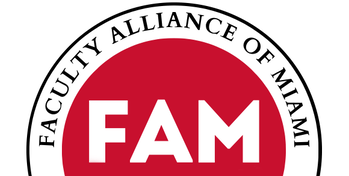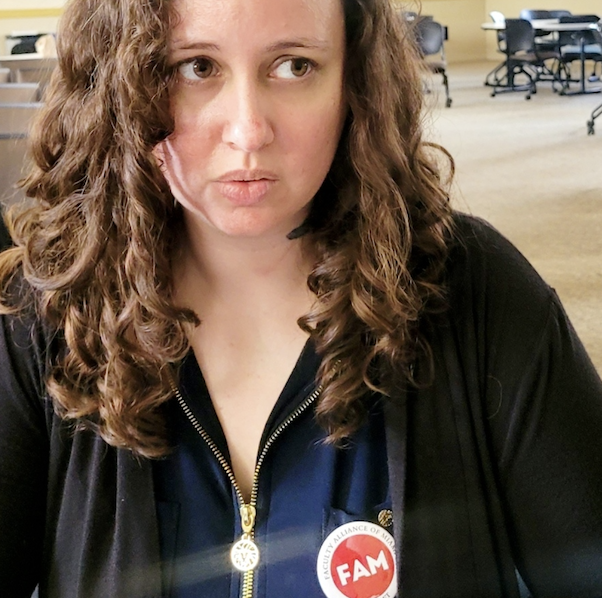Librarians Unit (FAM-L)
Good afternoon. I think most everyone here knows me by now, but for those who don’t, I’m Ginny Boehme. I have been a science librarian here for a little over six years, and I have been elected by my librarian and faculty peers to represent them as the lead negotiator for these sessions. This is a responsibility I do not take lightly. I am humbled by the trust they have placed in me and forever grateful for the amazing work they are putting in to support every single one of us here at the table across from you.
“You have the power to change the anti-collegial atmosphere. You have the power to show us that you are willing to work with us. I sincerely hope you exercise that power.”
That being said, those of you who listened to or read Sam Morris’ statement from the second day of negotiations for the faculty unit may notice a marked difference in the overall tone of his statement compared to mine. I have the dubious benefit of a few additional weeks of observation of how the Miami leadership is approaching these negotiations, and although I’m honestly not shocked, I’m extremely frustrated and disappointed in the actions that have been taken thus far.
During the first table session for the faculty unit, I presented an argument for combining the negotiations for both the faculty and librarian units. To be clear, our hope was not that the university would combine the units, which would be in conflict with the state labor board’s decision. Our hope was simply that the university would see the benefit of combining the table sessions for the two units, to save us all a bunch of headaches, to save us from miscommunication between the two legal teams, and to save the university money by reducing the amount of billable hours from those two legal teams.
“Our hope was simply that the university would see the benefit of combining the table sessions for the two units, to save us all a bunch of headaches, to save us from miscommunication between the two legal teams, and to save the university money by reducing the amount of billable hours from those two legal teams.”
—Ginny Boehme
The university has officially rejected that proposal, and so here we are. However, as expected, the disorganization and lack of communication is already starting to show. The two legal teams do not seem to be communicating in any regular fashion, leaving primarily the librarians in the lurch. No official notice of the university’s intent to pause several Senate committees was communicated to the librarian unit until after we initiated a conversation about it. When we did finally receive information, it was incorrect and it was incomplete. And so far, on the rare occasion FAM gets communication from both legal teams, that information is in direct conflict. The faculty unit legal team says one thing, the librarian unit legal team says something completely different. It would honestly be funny if it didn’t matter so much and show a complete lack of knowledge about what librarians do and a lack of respect for us in general.
This disorganization is clearly causing issues not only for the two FAM units, but also the two legal teams that Miami leadership has retained. It is holding up this entire process, and forcing us to continually rehash things that should have been settled long ago.
Sam Morris’ statement a few weeks ago was a passionate appeal to positivity and collegiality. We want to be collegial about this. We want to collaborate. Miami leadership has continually shown that they do not. They very clearly do not respect the librarians’ position in FAM, they very clearly do not respect or understand our position in the larger structure here at Miami or the work that we do for this university.
“Sam Morris’ statement a few weeks ago was a passionate appeal to positivity and collegiality. We want to be collegial about this.”
—Ginny Boehme
This attitude is not new to us. We as librarians are still dealing with the legacy of those who came before you, who also didn’t understand what we do and weren’t particularly interested in learning. In a 1995 letter from then-Associate Provost Joe Urell to then-Provost Ann Hopkins, Dr. Urell said that it was his perception that librarians at Miami want desperately a number of things, and he specifically listed governance participation, respect, and wages. How dare we want those things that our faculty colleagues have? How dare we?
Frankly speaking, these are things we still do not have. Out of the 24 committees of the University Senate, librarians have dedicated voting membership on 3. Our wages are drastically and depressingly lower than those of our faculty colleagues, even though we do the same amount of work, if not more. We also have to regularly request edits to our annual evaluation letters: to make sure our titles are accurately reflected — “Dr.” instead of “Mr.” or “Ms.” To make sure our administration is not misgendering us; that’s a distressingly common issue. To remove shockingly sexist language and other instances of bias that go into our official evaluation letters, that are included in our packets when we go up for promotion.
The lack of respect is also shown in how our concerns about workload and burnout are currently addressed by our administration. We are constantly being asked to do more with less. Our lines keep getting cut and not replaced. Most of us are working far more than 40 hours a week, and even then we still have outliers. The bulk of the work in several departments is disproportionately placed upon a small number of people, and when those people have come forward to say “this is too much, this is unfair”, they get a condescending pat on the head, a “well done, you’re such a go-getter”. Meanwhile, they are being told by medical professionals that the damage to their health over the last few years due to stress at work is comparable to what is seen in patients with PTSD. This is unsustainable. It is not ok.
And with all of the communication issues, with all of the disorganization for these negotiations, Miami is sending a clear message: they don’t care. They want us to spend more time than is necessary at these tables, they want us to be overwhelmed and burnt out to the point that we can’t focus on negotiating a contract that works for both parties and that improves the terms and conditions of our employment.
Those of you at that table have the power to change this. You have the power to change the anti-collegial atmosphere. You have the power to show us that you are willing to work with us. I sincerely hope you exercise that power. Thank you.
More: Read Why Librarian Negotiations Matter to All Faculty and catch up on what happened at the first day of FAM-L bargaining.



Leave a Reply